|
|
|
Sort Order |
|
|
|
Items / Page
|
|
|
|
|
|
|
| Srl | Item |
| 1 |
ID:
123525
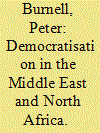

|
|
|
|
|
| Publication |
2013.
|
| Summary/Abstract |
This article offers perspectives on the prospects for democratisation in the Middle East North Africa (MENA) region in the light of political developments since 2010, with particular reference to international democracy support. An introduction shares certain assumptions about democracy support's general record before threats and opportunities to democracy support arising from developments in the region are discussed. Next democracy support's response to those developments is examined, while the fourth section highlights some challenges for democracy support in the region and beyond. Throughout, discussion is contextualised within the larger literature on democratisation. Final remarks lead to the conclusion that developments in the region both present challenges that should be viewed as opportunities, and offer opportunities that will be challenging to address, not just for democracy support in the region and further afield but in terms of the guidance that democratisation studies have to offer.
|
|
|
|
|
|
|
|
|
|
|
|
|
|
|
|
| 2 |
ID:
123529
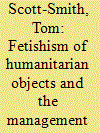

|
|
|
|
|
| Publication |
2013.
|
| Summary/Abstract |
This paper examines two common objects in humanitarian assistance: a therapeutic food called Plumpy'nut, and a tape for measuring malnutrition known as the muac band. It argues that humanitarian relief has become a standardised package reliant on such objects, which receive excessive commitment from aid workers and are ascribed with almost magical powers. Drawing on the Marxist notion of commodity fetishism, the paper proposes a three-part model for examining this phenomenon, in which humanitarian objects are bound up in processes of concealment, transformation and mystification. First, these objects are perceived as rootless, recent discoveries, allowing the complex history and ambivalent results of technology to be concealed. Second, they facilitate a single-minded attention to efficiency and aggregate survival, which transforms the way humanitarian action is understood. Third, these objects are imbued with a mystical and autonomous spirit, redefined as irreplaceable elements of aid. This 'fetishism of humanitarian objects', the paper concludes, prevents a more flexible and people-centred approach to relief.
|
|
|
|
|
|
|
|
|
|
|
|
|
|
|
|
| 3 |
ID:
123523
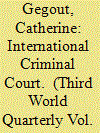

|
|
|
|
|
| Publication |
2013.
|
| Summary/Abstract |
The International Criminal Court ( icc ) aims to promote not only justice, but also peace. It has been widely criticised for doing neither, yet it has to contend with some severe structural and political difficulties: it has limited resources, it faces institutional restrictions, it is manipulated by states, and it is criticised for an alleged selectivity in the way it dispenses justice. However, the icc could contribute significantly to the promotion of international justice and peace, and have a major impact on the prevention of crime, since its prosecutions represent a clear threat to highly placed individuals who commit serious crimes. While this article concentrates on the work of the icc in Africa, the only continent where it has issued indictments against suspected criminals, it also looks at its efforts on other continents. It argues that, in the larger international context, the contribution of the icc to international justice and peace depends on its institutional power and the support it receives from states, on its own impartial work, and on the way it is perceived by potential criminals and victims in the world.
|
|
|
|
|
|
|
|
|
|
|
|
|
|
|
|
| 4 |
ID:
123521


|
|
|
|
|
| Publication |
2013.
|
| Summary/Abstract |
This article unpacks the renaissance of interest in 'the local' in peace building. It pays increased attention to local dimensions of peace in a wider context of increased assertiveness by local actors as well as a loss of confidence by major actors behind international peace-support actors. The article sees the 'local turn' in peace building as part of a wider critical turn in the study of peace and conflict, and focuses on the epistemological consequences of the recourse to localism in the conceptualisation and execution of peace building. The local turn has implications for the nature and location of power in peace building. This article is largely conceptual and theoretical in nature but it is worth noting that the local turn is based on reactions to real-world events.
|
|
|
|
|
|
|
|
|
|
|
|
|
|
|
|
| 5 |
ID:
123522
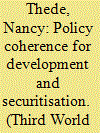

|
|
|
|
|
| Publication |
2013.
|
| Summary/Abstract |
Often treated as separate paradigms, the security-development nexus and the aid effectiveness agenda are analysed here instead as a continuum of aid policy responses that attempt to stabilise power relations in a contested and unstable international arena These responses are informed by a common commitment by western donor governments to neoliberal logic since the early 1980s. The article focuses on the discourse of policy coherence for development promoted by the DAC (Development Assistance Committee) of the OECD (Organisation for Economic Cooperation and Development), analysing it as the common vector of the two dimensions - effectiveness and security - of donor aid policy. By examining the emergence and transformations of the concept of coherence over the past two decades, it underlines the predominance of continuity over rupture in three successive phases of stabilisation (economic, political, security).
|
|
|
|
|
|
|
|
|
|
|
|
|
|
|
|
| 6 |
ID:
123520
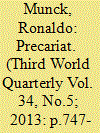

|
|
|
|
|
| Publication |
2013.
|
| Summary/Abstract |
The term 'precariat'-a precarious proletariat-has achieved considerable prominence in recent years and is probably now ripe for critical deconstruction. It also needs to be situated in terms of a genealogy that includes the marginality debates of the 1960s, the later informal sector problematic and the 'social exclusion' optic that became dominant in the 1980s. I will argue that the concept is highly questionable both as an adequate sociology of work in the North and insofar as it elides the experience of the South in an openly Eurocentric manner. In terms of political discourse I think we should avoid the language of 'dangerous class', as deployed by Guy Standing to situate workers politically in the policy world as though frightening the ruling classes was a strategy for transformation.
|
|
|
|
|
|
|
|
|
|
|
|
|
|
|
|
| 7 |
ID:
123528
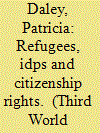

|
|
|
|
|
| Publication |
2013.
|
| Summary/Abstract |
Persistent civil warfare has created a crisis of protection for vulnerable refugees/returnees and internally displaced people ( idps ) in the African Great Lakes region. This is in the context of increasing state hostility towards refugees, intensified inter-group competition among citizens, and rising xenophobia towards African 'foreigners'. Humanitarian solutions are often de-contextualised from struggles over entitlements, citizenship and exclusionary practices based on social hierarchies, ethnicity and indigeneity. Hence, they tend to contribute to rather than alleviate the marginality experienced by the displaced. This article argues for further exploration of the processes of identity construction that accompany displacement and humanitarianism and their problematic relationship with sovereignty and citizenship. It suggests that transcending marginality requires greater emphasis on political agency within refugee and idp communities-for their voices to be part of negotiations and conversations on repatriation and integration-in order for them to rejoin the political community.
|
|
|
|
|
|
|
|
|
|
|
|
|
|
|
|
| 8 |
ID:
123527


|
|
|
|
|
| Publication |
2013.
|
| Summary/Abstract |
This article analyses the widely reported increase of unfree labour in Africa through neoliberalism, arguing that, far from an individual relationship of domination epiphenomenal to global political-economic restructuring, unfree labour must be understood as a social relationship of insecurity and exploitation whose acceleration in recent decades is traceable to broader shifts in the relations of production and social reproduction. These include the impact of labour market reform and privatisation on wages, employment and poverty; the rise of informalisation, including the marketisation of social reproduction; Africa in the international division of labour and labour conditions in global supply chains; and the rise of brics, the 'new scramble' for African resources and markets, and intensified processes of primitive accumulation. In a continent beleaguered by the slave trade and the systematic, widespread and brutal exploitation of forced labour during the colonial era, concerns around labour conditions of violence, bondage and coercion are particularly acute. Understanding the complexities of labour unfreedom in Africa today requires an understanding of the various forms and layers of coercion, immobility and exploitation fundamental to the contemporary social structures of capitalist accumulation, overcoming the binary typically posited between free and unfree labour.
|
|
|
|
|
|
|
|
|
|
|
|
|
|
|
|
| 9 |
ID:
123524


|
|
|
|
|
| Publication |
2013.
|
| Summary/Abstract |
This article discusses the lessons of previous peace processes between the government of Colombia and the Revolutionary Armed Forces of Colombia (farc). It has two policy implications. In regard to Colombia it suggests that safeguarding the lives of demobilised farc members is necessary for the current peace process to succeed, hence it proposes a hybrid Specialised Protection Force (spf). In terms of peace building the article discusses the challenges for spfs to avoid becoming tools of foreign policy diplomacy that perpetuate conflicts. The article aims to contribute to both the critique of liberal peace and of the negotiating teams in the current Colombian peace process.
|
|
|
|
|
|
|
|
|
|
|
|
|
|
|
|
| 10 |
ID:
123526
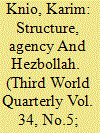

|
|
|
|
|
| Publication |
2013.
|
| Summary/Abstract |
The role and nature of Hezbollah's involvement in Lebanese politics has been an omnipresent topic in Middle Eastern studies. The recent 'Arab Spring' uprisings further accentuated this complex role, given the party's support for every single popular resistance movement in the Arab world, with the exception of Syria, its major political ally in the region. This stark contradiction highlights once again the question of how far Hezbollah should be perceived as a proxy client of both Iran and Syria or whether it represents an intrinsic and genuine local resistance movement. In this article I argue that scholarly treatment of Hezbollah's nature, which has oscillated between structure-led, agency-led and dualistic types of analyses, is problematic. The article proposes a historically situated dialectical analysis of structure-agency which can potentially explain better how a legitimate social force can still be understood within the premises of proxy client politics.
|
|
|
|
|
|
|
|
|
|
|
|
|
|
|
|
|
|
|
|
|